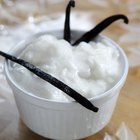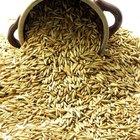
Vinegar might seem like a strange thing to go into bread, but it plays a few important roles. Vinegar makes the water in bread dough more acidic, and acidic water is desirable when baking bread because it encourages yeast growth. The vinegar also slows the molding process of the finished baked goods. Most recipes call for distilled white vinegar, but malt vinegar can be substituted.
Varying Vinegars
Some bread recipes call for malt vinegar. If you want to substitute it for malt vinegar, you need to keep a few differences and one important similarity in mind. White vinegar is just 5 percent acetic acid and 95 percent water, and it is sourer than malt vinegar. Malt vinegar comes from a process that begins with malted barley and ends with sweet malt vinegar. Substituting malt vinegar for white vinegar alters the bread's flavors, making it slightly sweeter. Also, when substituting malt vinegar for white vinegar, make sure that the malt vinegar contains 5 percent acetic acid to give the dough the needed acidic level.
Related Articles

How to Make Toasted Bread Sticks With ...

Calories in One Slice Provolone Cheese

How Long Does Banana Bread Stay Fresh?

How Many Calories are in Cheese Lasagna?

How to Freeze Empanadas

How to Freeze Brioche

Can I Substitute Bleached for ...

How to Make Whipping Cream With Milk

Can You Use Vegetable Oil Instead of ...

How to Clean Hair With White Distilled ...

How Much Whole Grain Should You Eat a ...

How to Soften Overly Hard Bread

Can You Make Dumplings With Corn Starch?

How to Cook Lasagna Noodles so They ...

Can I Make Doughnuts From Frozen Yeast ...

How to Substitute Cornstarch for ...

How to Cook Luglug Cornstarch Noodles

How to Roast Italian Sausage

The Carbohydrates in Blueberries

How to Store Oat Bran
References
Writer Bio
Chance E. Gartneer began writing professionally in 2008 working in conjunction with FEMA. He has the unofficial record for the most undergraduate hours at the University of Texas at Austin. When not working on his children's book masterpiece, he writes educational pieces focusing on early mathematics and ESL topics.
Photo Credits
Ryan McVay/Stockbyte/Getty Images